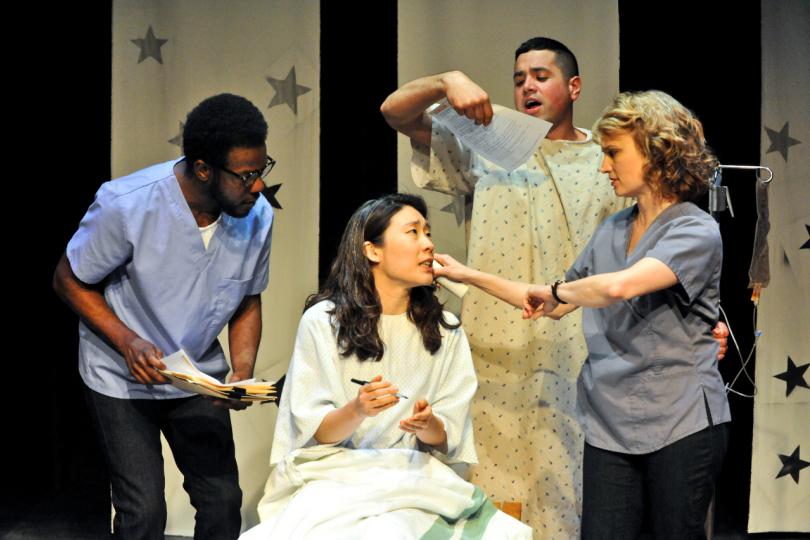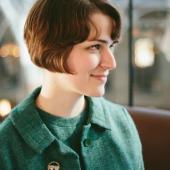It Has to Be Better: Conversations and Connections at Pillsbury House + Theatre

Change will come. Just not on your schedule.
I’m paraphrasing the last line of the first play in The Great Divide: Plays for Broken Nation. It’s onstage now until April 30 at Pillsbury House + Theatre. An evening of five ten-minute plays from local playwrights, The Great Divide gives the audience a chance to engage with the election outside of the bombardment of the news cycle.
“I think theatre offers a space to process everything that’s going on in a different way, and in a more flexible way,” says director Ellen Fenster. “There’s only so much we can process in our heads, by ourselves and with one another. It’s kind of a relief to make some of these things abstract.”
It’s true that none of the plays grapples directly with the election, but the evening opens with the recorded voices of several people talking about the fallout: one young woman talks about how her mother is now afraid to leave the house, fearing another deportation and separation from her autistic son. Other folks say they didn’t care for either major-party candidate. These snippets and the supporting music from DJ Chamun invite the audience into an evening where we can sit in darkness, breathe, and connect differently.
Pillsbury House + Theatre responded quickly to the election, pivoting out of their season-planning to commission five playwrights (Benjamin Benne, Alan Berks, Christina Ham, Katie Va Vang, and James A. Williams) to develop work that seeks to generate conversation and provide people a space for processing. “It creates quite a journey...there are no two pieces that are remotely alike,” says Benne. His piece, a dramatic poem called I Hate to Burst Your Bubble #sorrynotsorry, is the result of his feelings of disorientation as a result of the election and the ensuing onslaught of news item upon news item. Some of those news items enter his play: two penguins floating on a melting iceberg, zebras are black with white stripes, Antarctica hit a record high this year.
If that all sounds like kind of a bummer, I mean, yeah, obviously (except for the zebras; that’s rad). But Benne’s language and Fenster’s direction keep the tone away from fear-mongering or alarmism. This is consistent with the whole evening, which Benne describes as “more of a ‘here are the questions that have been raised post election, and here are the different points of view around that question.’ ”
Williams’ In Case of Sudden Loss of Cabin Pressure and Ham’s The Fourth were especially successful in parsing multiple sides of a question. In ...Cabin Pressure, two men meet in a gym sauna. One is black (played by Mikell Sapp), and the other (Ricardo Vázquez) recently moved from a tiny town of 400 that was homogenous. They’re initially uncomfortable, but they break the ice and move on. The next time they meet, the small-town guy asks the other if he’d like to grab coffee: he wants to learn about privilege, his own privilege. Sapp bristles at this request to perform intense emotional labor. He asks, “Once we’re done unpacking your privilege, will you stick around to unpack my trauma?” Vázquez argues that people need to have more conversations or they’ll just pass on their prejudices to the next generation. Isn’t it better to take a chance?
The Fourth tracks the changing of a neighborhood through four neighbors who live closely but rarely speak to one another. Each have come to the neighborhood with wildly different backgrounds: one is a family man, one a young telecommuter, one a divorcee, one a soldier experiencing PTSD, jumping at each firework and barking dog. Ham’s skillful balance of these voices results in a haunting vision of how quickly things can change. It’s a repudiation to anyone who would say they’re “not that kind of neighborhood.”
The cohesion of the four members of the ensemble (Tracey Maloney, Audrey Park, Mikell Sapp, and Ricardo Vázquez) is evidence they’ve been part of the development of these plays from the beginning. Benne tells me the playwrights and actors went through three workshops before rehearsals began. Each ensemble member is a knockout in their own right, filling their roles with assurance and conviction. Vázquez shines in Williams’ plays as the small-town guy living in a big city for first time, unsure of how to reach out and connect. Park is convincing and heartbreaking in her frustration in Katie Va Vang’s Who’s Payin?, a play about the sky-high costs of medical care. Tracey Maloney is understated and, in some instances, rather sinister in her role as the only white person onstage. Mikell Sapp, in particular, truly inhabits each role, taking on seven characters in the course of the evening and knocking them all out of the park. In the intimacy of Pillsbury House, I find that especially remarkable.
Ellen Fenster’s direction is chameleon-like, morphing to suit the tone and style of each piece and subtly showing her abilities. In Who’s Payin?, Audrey Park is stuck in a hospital bed while the other ensemble members whirl around her, managing to look like 50 people instead of three. In Benne’s piece, the ensemble floats through a nebulous space, pulling apart and coming back together like cells under a microscope. Her touch is also noticeable in how she ordered the evening, giving an arc to these otherwise unrelated plays.
Framing the evening’s plays are simple white banners with gray and black stars spray-painted on (environment designed by Kellie Larson). The floor is painted with a rough map of the United States, most of it red with some patches of blue. These symbols of America—stars, red-white-blue, maps, banners—have a careworn feel, suggesting the broken state the title claims. Lighting designer Michael Wangen gets to show his range, with lighting ranging from hospital fluorescents to colorful polka dots for Benne’s piece. Keeping things minimalistic allows the audience to focus on the words and ideas in each play, and the pauses between each—filled with DJ Chamun’s layered beats that mimick the evening’s multiplicity of voices—provide time for reflection.
If there are any drawbacks to The Great Divide, it is that the evening is over so quickly. While there was no Q&A on opening night when I attended, each subsequent performance will offer time afterward for reflection and discussion among the audience members. Fenster hopes the plays and the Q&As will allow audiences to “drop down to their gut or emotional level, drop down below the neck and say, ‘I’m having a feeling.’ What happens if we open our hearts and let ourselves have a feeling and then talk?” The plays in The Great Divide tell us those conversations won’t be easy—such conversations never are—but that talking and connecting are necessary.
As the audience leaves the theatre, ushers hand each person a folded piece of paper. When you open it, you see suggested actions for making a positive impact in your community. For anyone grappling with what can be done to reach out to neighbors or family members, to fix their neighborhood, to heal the nation, this is a good place to start. Change may not happen on our schedule, but with The Great Divide and with Pillsbury House, we can invite that change. The world may never be perfect, as characters in Benne’s piece say, but it can always be better. It has to be better.




